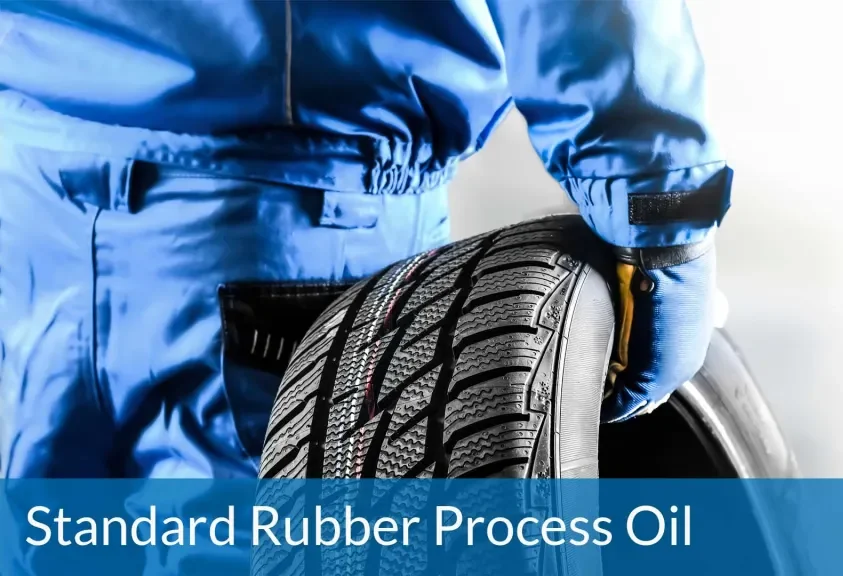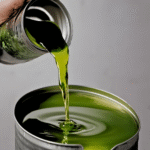What is Standard Rubber Process Oil? Uses, Types, Benefits & More
Standard Rubber Process Oil (RPO) refers to a commonly used type of rubber process oil that meets industry standards and specifications. It is a versatile oil that is widely used in the rubber industry for various applications.
Standard Rubber Process Oils (RPO) are formulated to provide optimal processability and performance in rubber compounding and processing. They act as plasticizers, softening agents, and extenders in rubber formulations, improving the flow properties, flexibility, and durability of rubber products.
What is Standard Rubber Process Oil?
Standard Rubber Process Oil (RPO) is a petroleum-derived oil used extensively in the rubber manufacturing industry to improve the processability, flexibility, and workability of rubber compounds. It is a non-reactive, viscous fluid that acts as both a processing aid and a cost-effective extender for rubber polymers.
From automotive parts to footwear and tires, RPO plays a critical role in ensuring smooth production and consistent product performance.
🧪 Chemical Composition & Nature
Rubber Process Oils are complex blends of hydrocarbons and are usually classified into three main types based on the predominant hydrocarbon structure:
| Type | Primary Hydrocarbon Structure | Solvency | Polarity | Color |
|---|---|---|---|---|
| Aromatic | Aromatic rings | High | High | Dark |
| Naphthenic | Cycloparaffins (naphthenes) | Medium | Medium | Light |
| Paraffinic | Straight-chain hydrocarbons | Low | Low | Pale Yellow |
🏭 Manufacturing Process
Rubber Process Oil is manufactured through the refining of crude oil and involves the following key steps:
-
Distillation of crude to obtain base stocks
-
Solvent extraction to remove aromatic or polar compounds (if needed)
-
Dewaxing and hydrotreating for stability and clarity
-
Blending to achieve target properties (viscosity, color, solvency)
🔧 Why is RPO Used in Rubber Compounding?
Rubber Process Oil is essential in enhancing the processing behavior and physical properties of natural rubber (NR) and synthetic rubbers like SBR, EPDM, and BR.
Key Functions:
-
Acts as a plasticizer to reduce viscosity
-
Enhances filler dispersion (carbon black, silica)
-
Improves flow during extrusion and molding
-
Reduces energy consumption during mixing
-
Enhances flexibility, elasticity, and aging resistance
-
Helps lower the cost by extending rubber formulations
⚙️ Types of Rubber Process Oils
1. Aromatic Rubber Process Oil
-
High solvency
-
Dark color
-
Excellent filler compatibility
-
Ideal for: Tyre treads, conveyor belts, reclaimed rubber
2. Naphthenic Rubber Process Oil
-
Medium polarity
-
Better oxidation stability
-
Light in color
-
Ideal for: Footwear, hoses, gaskets, and colored rubber
3. Paraffinic Rubber Process Oil
-
High viscosity index
-
Good compatibility with EPDM
-
Pale yellow in appearance
-
Ideal for: Weather stripping, seals, automotive components
One of the key characteristics of Standard RPOs is their compatibility with different types of rubber, including natural rubber (NR), synthetic rubber (such as styrene-butadiene rubber or SBR, polybutadiene rubber or BR, and nitrile rubber or NBR), and blends of different rubbers. This versatility allows for their use in a wide range of rubber applications.
📊 Technical Specifications (Typical)
| Property | Typical Value |
|---|---|
| Appearance | Clear / Pale Yellow / Dark |
| Kinematic Viscosity @ 40°C | 30 – 200 cSt |
| Flash Point (°C) | 180 – 240 |
| Aniline Point (°C) | 60 – 110 |
| Pour Point (°C) | -5 to -30 |
| Density @ 15°C | 0.88 – 0.94 g/cm³ |
| Solubility | Insoluble in water |
(Note: Specifications vary by grade and type.)
Standard rubber process oils offer excellent dispersion of fillers and additives in the rubber compound, ensuring uniformity and consistency in the final product. They enhance the mixing and processing of rubber compounds, making them easier to mold, extrude, and calender.
Additionally, standard rubber process oils provide the necessary lubrication and lubricity during rubber processing, preventing the compound from sticking to the processing equipment and facilitating smooth and efficient operations.
📦 Main Applications of Standard Rubber Process Oil
| Industry | Use Case |
|---|---|
| Automotive | Tires, tubes, hoses, seals, belts |
| Footwear | Soles, slippers, boots |
| Industrial Rubber | Conveyor belts, gaskets, floor mats |
| Consumer Goods | Rubberized coatings, toys, handles |
| Cables & Wires | Electrical insulation and jacketing |
When selecting a standard rubber process oil, it is important to consider factors such as the specific rubber formulation, desired physical properties of the final product, processing conditions, and industry standards and specifications. Different grades and types of standard rubber process oils are available, offering varying viscosities, volatility levels, and performance characteristics.
It is crucial to ensure that the chosen Standard RPO complies with the relevant regulatory requirements and industry standards for safety, health, and environmental considerations.
🌍 Environmental & Safety Considerations
Modern RPOs, especially those used in tyres and toys, are manufactured with low Polycyclic Aromatic Hydrocarbon (PAH) content to meet EU REACH regulations and global safety standards.
-
✅ Non-toxic (in regulated grades)
-
✅ REACH & RoHS compliant (on request)
-
✅ Safe for human contact (in selected applications)
✅ Why Choose Rubber Process Oil from Pars Universal Bitumen?
Pars Universal Bitumen is a trusted name in the global oil and bitumen industry, offering high-performance Rubber Process Oils for the tire, footwear, and industrial rubber sectors.
Why Clients Trust Us:
-
✔️ Wide range of aromatic, naphthenic, and paraffinic RPOs
-
✔️ Customized viscosity and aniline point as per client specs
-
✔️ Export-ready packaging (drums, IBCs, flexitanks)
-
✔️ Consistent quality control across all batches
-
✔️ Expert support for R&D and formulation development
📌 FAQs About Standard Rubber Process Oil (RPO)
❓ What’s the difference between RPO and extender oil?
Extender oils are a broader category. RPO is a type of extender oil specifically designed for rubber processing.
❓ Is aromatic RPO harmful?
Older aromatic oils with high PAH content were considered carcinogenic. Modern aromatic RPOs from certified suppliers like Pars Universal Bitumen are low-PAH and safe for industrial use.
❓ Which RPO is best for EPDM?
Paraffinic RPO is most compatible with EPDM rubber due to its non-polar structure.
❓ Can RPO affect rubber aging?
Yes. Choosing the correct RPO type (e.g., naphthenic for better oxidation stability) is crucial for long-term durability.
❓ Do you provide custom RPO blends?
Yes. Pars Universal Bitumen can tailor viscosity, flash point, and color based on your formulation needs.
📢 Conclusion
Standard Rubber Process Oil is an indispensable ingredient in rubber compounding. It improves processing efficiency, cost-effectiveness, and product performance across diverse industries like automotive, footwear, construction, and more.
By choosing the right type of RPO and working with a reliable supplier like Pars Universal Bitumen, manufacturers can ensure both compliance and performance.
🚀 Call to Pars Universal Bitumen
Looking for Premium-Grade Rubber Process Oil?
Partner with Pars Universal Bitumen for:
-
✔️ Aromatic, paraffinic & naphthenic grades
-
✔️ Bulk availability with flexible packaging
-
✔️ Export support & fast delivery
-
✔️ Technical assistance and TDS/MSDS support
📩 Contact us now to get a quote or technical consultation.
📧 Email: [email protected]
📞 Phone: +971 4 878 2031
🌐 Visit: Pub-ltd
We offer high-quality Standard Rubber Process Oil (RPO) with custom packaging and fast international delivery. If you have any further questions, don’t hesitate to contact us.





